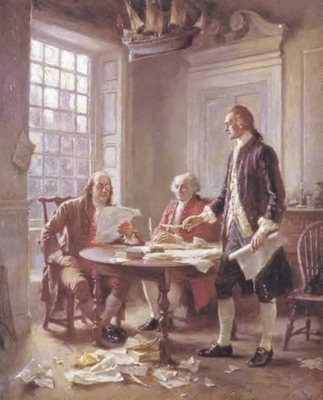Seleccionar idioma español/Choisissez la langue français

On 2 July 1776, the Continental Congress, comprising delegates sent by the legislatures of the thirteen colonies, voted to declare complete independence from British rule, and on 4 July the formal wording of the Declaration (principally the work of Thomas Jefferson) was approved and the document signed. The decision to seek independence rather than simply a restoration of the colonists' traditional rights as British subjects did not come readily or suddenly. Armies had been in the field for more than a year before the Declaration, and for another two years afterward, the officers of the Continental Army drank his Majesty's health at every mess. But the Declaration was rightly acknowledged as crucial. It speaks in terms of the Natural Law and God-given principles of justice and right, in language that, as one (British) writer has said, combines great prose, great politics, and great theology.
written by James Kiefer
The Declaration of Independence
When in the Course of human events, it becomes necessary for one people to dissolve the political bands which have connected them with another, and to assume among the powers of the earth, the separate and equal station to which the Laws of Nature and of Nature's God entitle them, a decent respect to the opinions of mankind requires that they should declare the causes which impel them to the separation.
We hold these truths to be self-evident, that all men are created equal, that they are endowed by their creator with certain unalienable rights, that among these are Life, Liberty and the pursuit of Happiness.
That to secure these rights, Governments are instituted among Men, deriving their just powers from the consent of the governed.
That whenever any Form of Government becomes destructive of these ends, it is the Right of the People to alter or abolish it, and to institute new Government, laying its foundation upon such principles and organizing its powers in such form, as to them shall seem most likely to effect their Safety and Happiness.
Prudence, indeed, will dictate that Governments long established should not be changed for light and transient causes; and accordingly all experience hath shown, that mankind are more disposed to suffer, while evils are sufferable, than to right themselves by abolishing the forms to which they are long accustomed. But [our grievances are neither light nor transient, and a list of them follows....]
We, therefore, the Representatives of the United States of America, in General Congress, Assembled, appealing to the Supreme Judge of the world for the rectitude of our intentions, do, in the Name, and by Authority of the good people of these Colonies, solemnly publish and declare, That these United Colonies are, and of Right ought to be Free and Independent States; that they are Absolved from all Allegiance to the British Crown, and that all political connection between them and the State of Great Britain, is and ought to be totally dissolved; and that as Free and Independent States, they have full power to levy War, conclude Peace, contract Alliances, establish Commerce, and to do all other Acts and Things which Independent States may of right do.
And for the support of this Declaration, with a firm reliance on the protection of Divine Providence, we mutually pledge to each other our Lives, our Fortunes, and our sacred Honor.
Lord God Almighty, in whose Name the founders of The United States of America won liberty for themselves and for us, and lit the torch of freedom for nations then unborn: Grant that we and all the people of this land may have grace to maintain our liberties in righteousness and peace; through Jesus Christ our Lord, who lives and reigns with you and the Holy Spirit, one God, for ever and ever. Amen.
Morning Psalm 33; Ecclesiasticus 10:1-8,12-18; James 5:7-10
Evening Psalm 107:1-32; Micah 4:1-5; Revelation 21:1-7